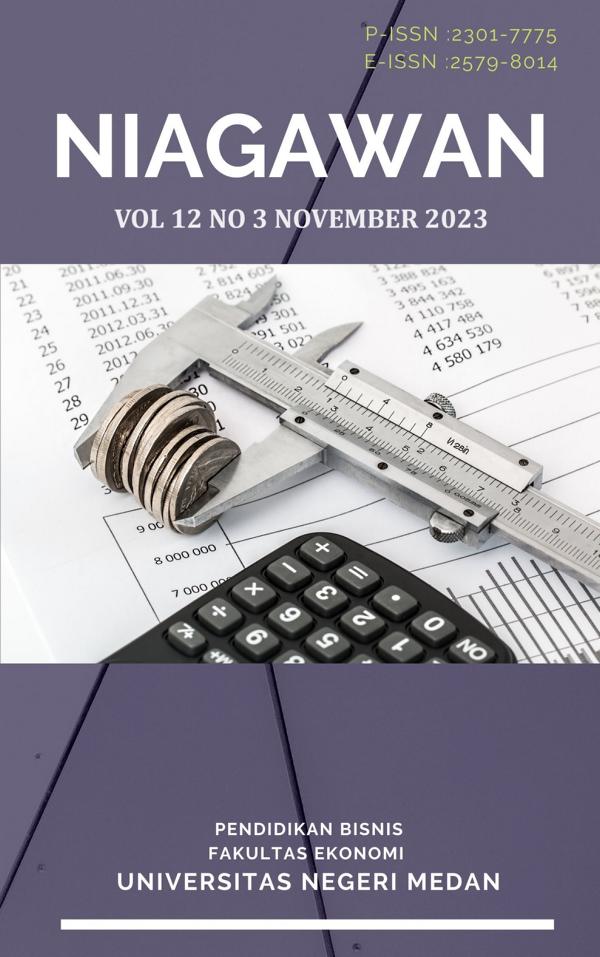PENGARUH BUDAYA, SOSIAL, PERSONAL, DAN PSIKOLOGIS TERHADAP PERILAKU MEMILIH KEUANGAN SYARIAH DI PROVINSI NANGGROE ACEH DARUSSALAM
DOI:
https://doi.org/10.24114/niaga.v12i3.47027Keywords:
Cultural, Social, personal, psychological, BehavioralAbstract
The purpose of this study is to determine and analyze how the behavior of the people of Aceh Province in choosing sharia financing as a place to finance motorbikes. This study also aims to find out the obstacles and efforts made by Islamic finance companies so that the people of Aceh choose Islamic finance as a place of financing. This type of research is a quantitative-qualitative method. The analysis technique used in quantitative research is the Structural Equation Model using AMOS 22.1 software, while qualitative research data is obtained through observation, interviews and documentation. The data analysis technique used in this study is an interactive model analysis consisting of data collection, data reduction, data presentation and drawing conclusions. This research resulted in cultural variables with a P value (0.703), social variables with a P value (0.070) and psychological variables with a P value (0.395). Each of these variables does not affect the behavior of the people of Aceh Province in choosing Islamic finance as a place of financing. While personal variables have a positive and significant effect on the P value (0.003) which is below the critical value of 0.05. Meanwhile, cultural, social, personal and psychological variables simultaneously do not influence people's behavior in choosing Islamic finance. The variables of culture on personal, cultural on psychology and social on psychology have a positive and significant effect, where each P value is brought to a critical value of 0.05. Personal variables and psychological variables do not have an indirect influence on the behavior of the people of Aceh Province in choosing Islamic finance with culture as an intervening variable. Likewise, personal and psychological variables do not have an indirect influence on the behavior of the people of Aceh Province in choosing Islamic finance with social as an intervening variable.References
Abdul Rahman, Agus. (2013). Psikologi Sosial: Integrasi Pengetahuan Wahyu dan Pengetahuan Empirik. Jakarta: RajaGrafindo Persada.
Engel, James F. et.al., (1997). Consumer Behavior. 8th Ed. Texas: Dryden Press.
Hakam, et, al. (2014). Analisis Jalur Terhadap Faktor-faktor Yang Mempengaruhi Indeks Prestasi Kumulatif (IPK) Mahasiswa Statistika UNDIP. Jurnal Gaussian. Vol. 4, No. 1. Semarang: Universitas Diponegoro.
Kotler, Philip dan Gary Amstrong. (2009). Prinsip-Prinsip Pemasaran. Jakarta: Erlangga.
Kurniati. (2016) Teori Perilaku Konsumen Perspektif Ekonomi Syariah, Jurnal Ekonomi Syariah Indonesia, Vol 6 No. 1.
Kussudyarsana. (2018) Budaya dan Pemasaran Dalam Tinjauan Pengaruh Budaya Terhadap Perilaku Konsumen, Jurnal Manajemen. Vol.12 Nomor 2.
Loudon, David L dan Albert J. Della Bitta. (2001). Consumer Behavior: Concepts and Applications. 4th Ed. New York: McGraw-Hill.
Machfoedz, Mahmud. (2010). Komunikasi Pemasaran Modern. Yogyakarta: Cakra Ilmu.
Muhaimin. (2012) Perusahaan Pembiayaan Syariah di Indonesia: Sebuah Tinjauan Analisis Terhadap Perusahaan Pembiayaan PT. FIF Syariah, At-Taradhi: Jurnal Studi Ekonomi.
Schiffman, Leon G. & Leslie L. Kanuk (2007). Consumer Behavior. Fifth Edition, Prentice-Hall Inc. New Jersey
Setiadi, Nugroho J. (2013). Perilaku Konsumen: Perspektif Kontemporer Pada Motif, Tujuan dan Keinginan Konsumen. Jakarta: PrePropinsi Acehamedia.
Supranto.(2014). Analisis Multivariat Arti & Interpretasi. Jakarta: Penerbit Rineke Cipta.
Zaltman, Gerald dan Melanie Wallendorf. (1979). Consumer Behavior: Basic Findings and Management Implications. USA: John Willey & Sons Inc.
Downloads
Published
Issue
Section
License
Authors who publish in this journal agree to the following terms:
- Authors retain copyright and grant the journal the right of first publication, with the work simultaneously licensed under a Creative Commons Attribution License that allows others to share and adapt the work with an acknowledgment of the work's authorship and initial publication in this journal.
- Authors can enter into separate, additional contractual arrangements for the non-exclusive distribution of the journal's published version of the work, with an acknowledgment of its initial publication in this journal.
- Authors are permitted and encouraged to post their work online before and during the submission process, as it can lead to productive exchanges and earlier and greater citation of published work. Where authors include such work in an institutional repository or on their website, we request that they include a statement acknowledging the Jurnal Perspektif Pembiayaan dan Pembangunan Daerah, including the name of the journal, the volume number, and a web link to the journal item.
- Authors should be aware that the Creative Commons Attribution 4.0 International License (CC BY 4.0) permits readers to share (copy and redistribute the work in any medium or format) and adapt (remix, transform, and build upon the work) for any purpose, even commercially, provided they also give appropriate credit to the work, provide a link to the license, and indicate if changes were made. They may do these things reasonably but not in any way that suggests the author or the publisher endorses their use.
NIAGAWAN by Program Studi Pendidikan Bisnis Fakultas Ekonomi Universitas Negeri Medan is licensed under CC BY-NC 4.0





